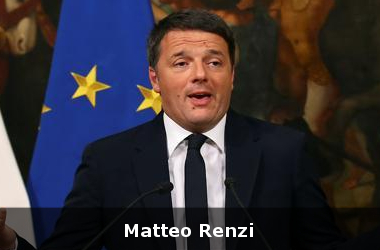
All you need to know about Italy’s referendum on EU
Italy saw a constitutional referendum on Sunday December 4, 2016 to decide whether the people approved of a constitutional law that amends the Italian constitution to change the composition and powers of the Parliament of Italy. It also included the division of powers between the state, the regions and administrative entities. Prime Minister Matteo Renzi introduced the bill first and announced to step down if Italy did not vote in favor of the proposed reforms. Well, Italy did reject the reforms by 59.11% majority. Matteo Renzi has announced the resignation and there will be a chain of consequences to look forward to.
Why was a referendum called for?After the bill was proposed and amendments were made to it several times, it got its first approval and soon after its second and final approval.
However, according to Article 138 of the constitution, a referendum had to be called for because the constitutional law had not been approved by a qualified majority of two-thirds in each house of parliament in the second voting.
Italy’s existing system:Italy has a perfect bicameral system which means that its two chambers have exactly equal powers. It often resulted in political congestion where coming to a conclusion was often difficult as their interests clashed and there was no coming to a common agreement without allowing the other to prevail over them.
The reform:1. The reform sought to reduce the Senate’s powers and transformed it from a chamber of 315 directly elected politicians and six lifetime appointees to a preferably smaller ‘senate of regions.’
2. The new chamber was to consist of just 100 seats - 74 regional councilors, 21 mayors, and five presidential nominees. They would be serving only for 7 years instead of the earlier lifetime powers.
3. The chamber of deputies is Italy’s equivalent of the House of Commons. The reform would have given them more power.
4. Though the Senate would have got the veto power, yet the deputies would have got to keep the power of final say regarding every day bills. Even the senate’s suggestions wouldn’t be binding upon the deputies.
Why was the reform criticized?The proponents of the bill were of the view that the poor stability of the government needed reforms and amendments to make it more organized and powerful. Renzi thought that the government was slow and costly and they needed reforms. Here’s why his ideas were criticized.
- Opponents, however, believed that the proposed bill would bring back anarchy and make the government more powerful than required.
- It was also said to be poorly written without considering the consequences that might have followed.
- Renzi was criticized of being authoritarian and anti-democratic for proposing a bill that would make the government triumphant over the common people and laws.
- The reform was approved by Renzi without reaching any consensus (which is deemed necessary in Italy) among a plurality of the political parties in the constitution.
- Interests of the regions were not well represented in the reforms. Their powers were to be weakened and method of selection of senators was also ill-planned.
- There were possible risks of improbability and disparity in legislative procedures which was bound to create issues later.
- Small regions were to be left powerless according to the proposed bill.
Consequences of the referendum:1. Renzi will resign and President Mattarella will appoint a caretaker government to rule Italy until its next general elections will be held in 2018.
2. It is mostly predicted that Finance Minister Pier Carlo Padoan will be chosen as the next Prime Minister and he will have to pass an electoral reform called Italicum.
3. Italicum will have the power to give any party that wins 40 percent in the next general election a guaranteed parliamentary majority.
Will Italy leave EU?This is the big question that comes into the front after the referendum gets a No. MS5 had promised a referendum on single currency membership once they come into power. They did stop short on calling for a vote on EU membership and instead the Euro-skeptic party is bent on reforming the overflowing and tyrannical coalition.
If a voting is to be called, it is more likely that Italy will prefer to opt out of EU. Majority of people in Italy think that Brussels’ handling of economy and refugee crisis is inefficient. Very few people are of the view that there are definite benefits of staying intact with EU.
Another report suggests that the referendum and PM quitting his post will have nothing to do with Italy’s membership in EU.